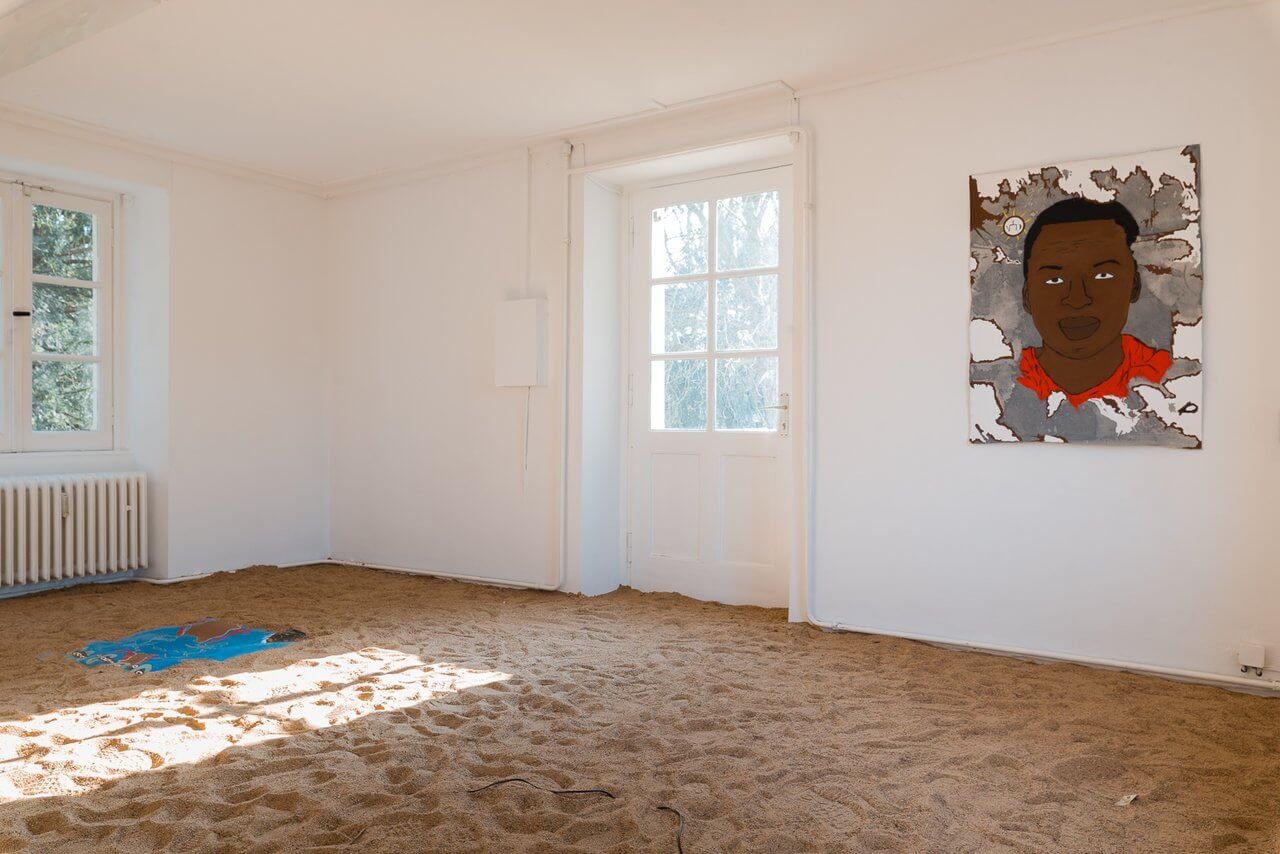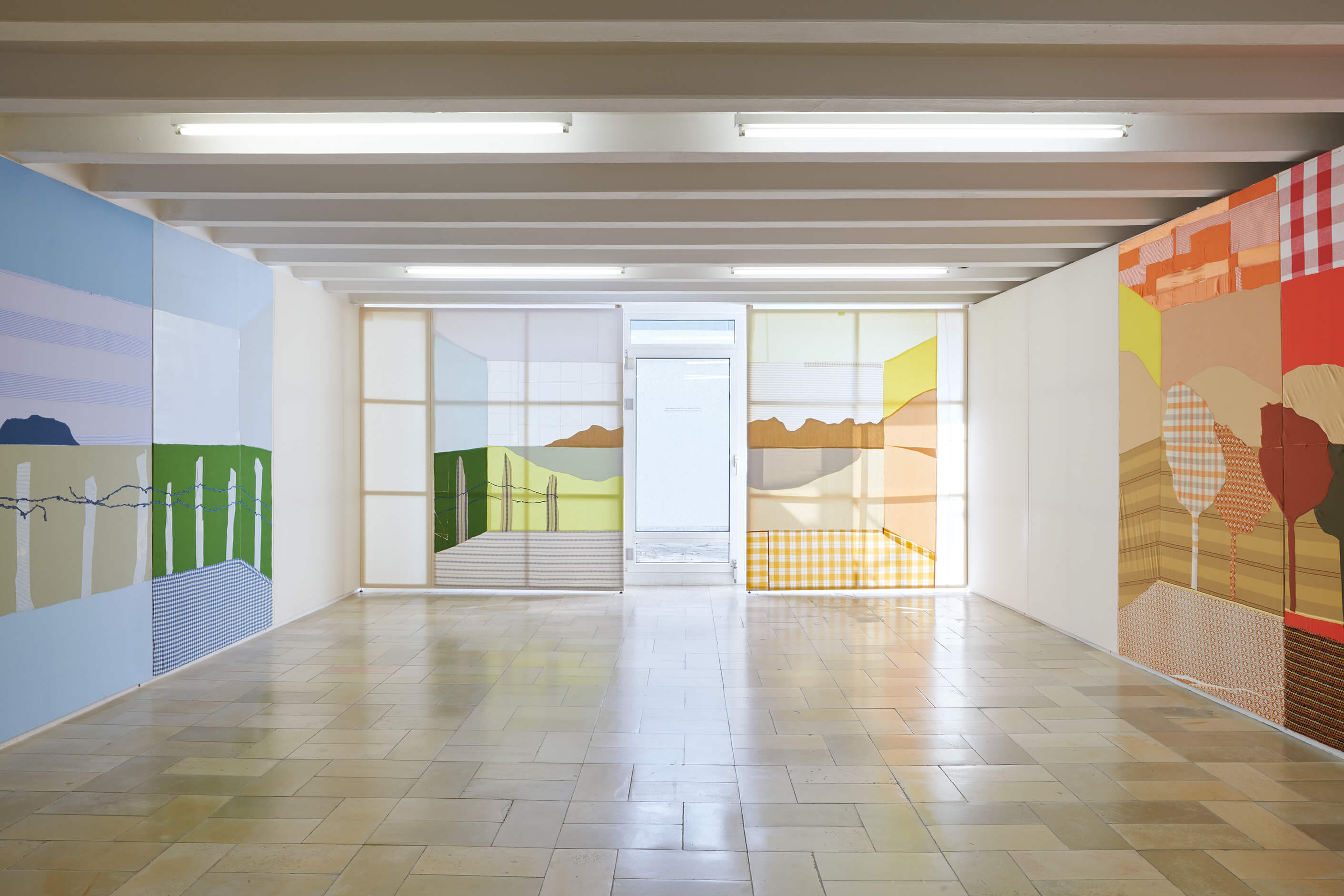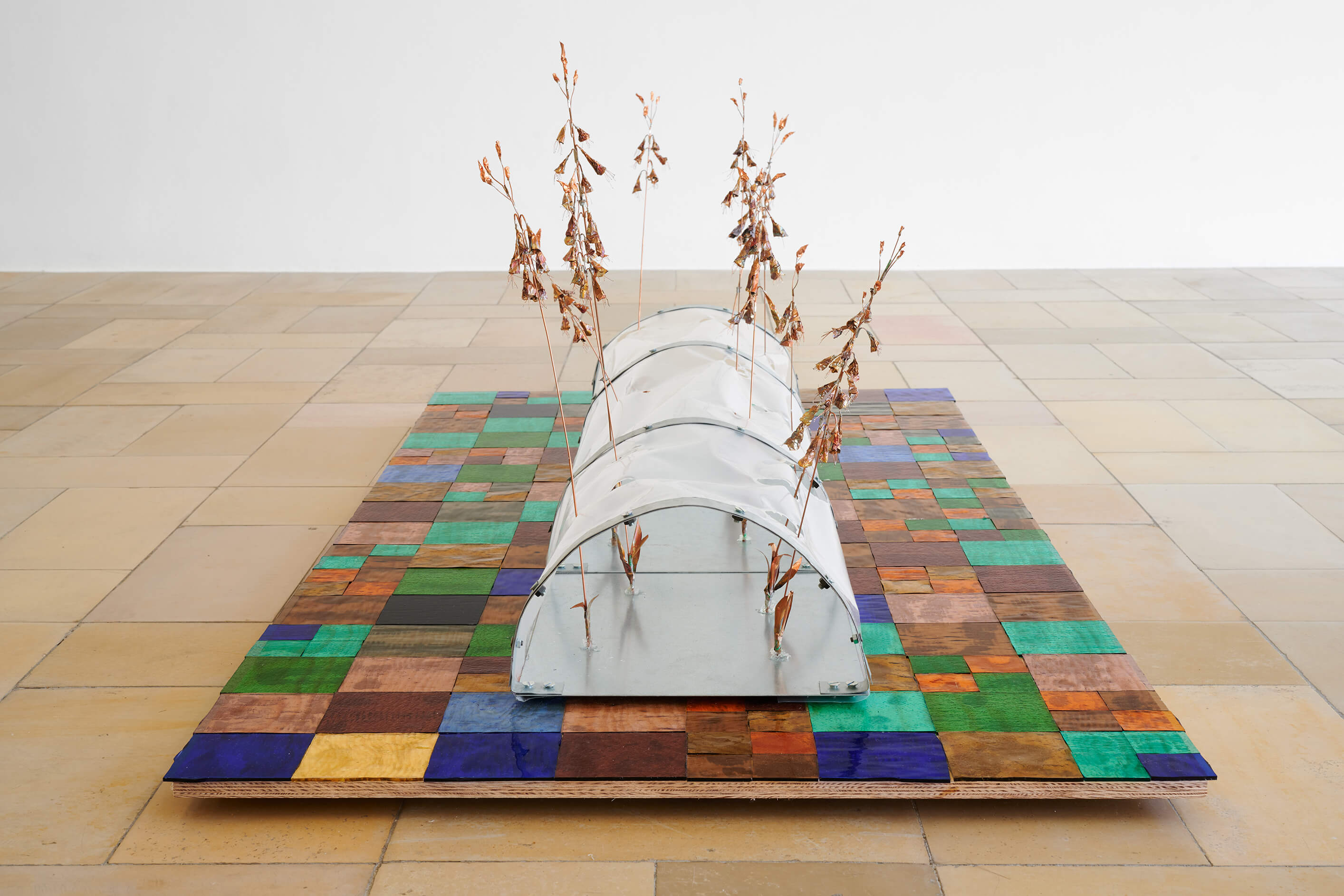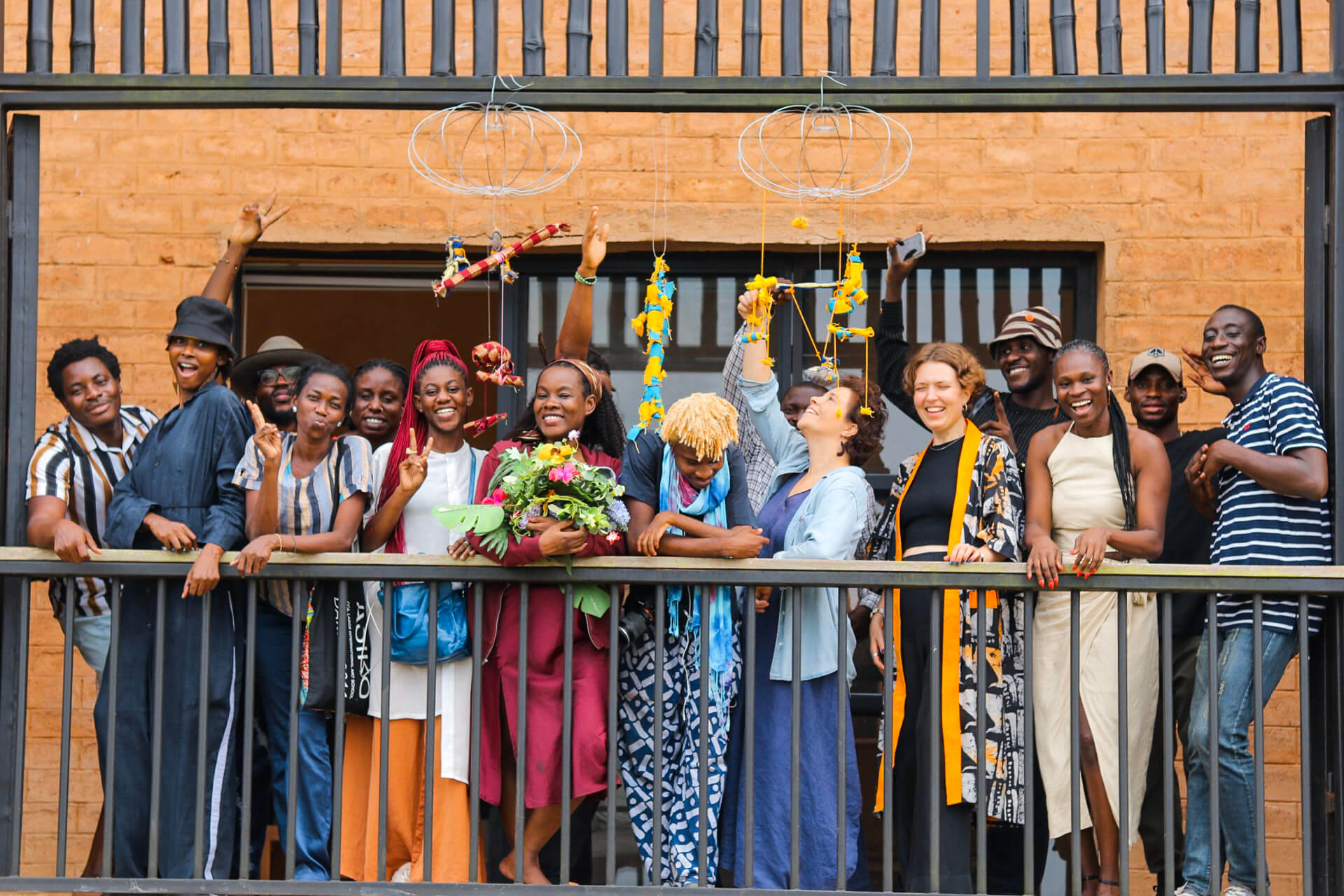Miriam Bettin is the second of three curators based in Germany to join us at G.A.S. Lagos as part of the TURN2 Programme. The initiative developed by the German Federal Cultural Fund was conceived to facilitate artistic co-creation between Germany and African countries. We asked Miriam to share her hopes and aspirations for the two-month residency with us.
What is the current focus of your practice?
The close connection to the teaching and production of contemporary art since my study time has decisively shaped my practice of curating, art criticism, and mediation to this day. My collaborative, queer-feminist, anti-racist, intersectional, and transdisciplinary approach manifests itself not only in my curatorial programme but also in site-specific, close cooperations with artists and colleagues between the local and the global.
For me, curatorial work implies accompanying, supporting, communicating, and empowering artistic processes with great sensibility and empathy.
My curatorial interest is subject-based rather than media specific. Nevertheless, with the returning presence of textile-based works in contemporary art since its peak in the feminist art of the 1960s and 1970s, my current curatorial research investigates the conceptual, social-political, emancipatory, anti-colonial, and queer qualities of the medium and looks at how it is defined and shaped by corporealities, spiritualities, communities, histories, race, class, and gender.
Belittled by patriarchy as decorative and primitive, domestic and female* connotated craft such as textile describes a radical shift from the formal austerity, minimal and rationalist concepts of Western Modern art – resulting in broad accessibility, flat hierarchies, and democratisation. Historically, its status between art and craft was questioned in a misogynistic art world. Today, there is an opportunity to take a new look at the medium and its qualities on a broader level, far away from discourses of justification and media-specific self-assurance.
 Marvin Luvualu António, Yellow Solar Human, 2018, Installation view Kunstverein Braunschweig, Courtesy: the artist. Photo: Stefan Stark.
Marvin Luvualu António, Yellow Solar Human, 2018, Installation view Kunstverein Braunschweig, Courtesy: the artist. Photo: Stefan Stark.
What drew you to apply for this residency and how do you think it will inform your wider practice?
My interest for the megacity Lagos began with literature, fashion, and music (among others the writing of Teju Cole, Chimamanda Ngozi Adichie, Chinua Achebe, and the composing by Emeka Ogboh) and its insight into the vibrant cultural scene between tradition, awakening, diaspora, and mobility. This occupation continued through the collaboration with Swiss artist Dunja Herzog and her artistic research on Nigerian resources and crafts at the Kölnischer Kunstverein, Cologne (curated by Nikola Dietrich; together with Jumoke Adeyanju; Leke "CHiFY" Awoayinka; Adeju Thompson, Lagos Space Program; Susanne Wenger Foundation et al.).
With a particular focus on Nigerian art history, craft, and fashion design (i.e. Uli designs by the Igbo and the traditional 'adire' technique of indigo-dyeing cotton cloths), as well as current intersectional Black and queer-feminist discourses, I plan to continue my research on textile art while in Lagos by complementing crucial West African perspectives and positions that ultimately “(…) break down the misconception that queerness is a Western construct.“ (Adeju Thompson, „Lagos Space Program“, Violet Conroy, in: Show Studio. The Home of Fashion Film, May 18, 2021, https://showstudio.com/news/lagos-space-programme-im-trying-to-break-down-the-misconception-that-queerness-is-a-western-construct, 10.10.2022)
 Emma LaMorte, Aussicht, 2020, Installation view Kölnischer Kunstverein, 2020, Courtesy: the artist. Photo: Mareike Tocha.
Emma LaMorte, Aussicht, 2020, Installation view Kölnischer Kunstverein, 2020, Courtesy: the artist. Photo: Mareike Tocha.
Can you give us an insight into how you hope to use the opportunity?
What I appreciate about the TURN2 Residency at the G.A.S. Foundation in Lagos is the open-ended approach: I see the two months program as part of an ongoing research process which started two years ago with the first thoughts and ideas about the location and context, continued with the granting of the residency, a lecture at the ZAZ Bellerive in Zurich, and is now fluidly evolving towards a thematic focus. In my curatorial practice and writing it is crucial to think and work site-specifically and to react to and engage with times, places, and people. My hopes and expectations are exactly evolving around this: to have a framework and the privilege of time and resources to research, visit institutions, and to not only meet artists, curators, and other professionals from the cultural field, but also to get to know different social networks and organisations in order to catch a glimpse of the rich culture that Lagos has to offer (incl. fine arts, music, fashion, film, food, literature, architecture, religion).
In the first week I would like to get a first impression and feeling for the metropolis by looking and listening, to navigate the new surrounding, and to start a dialog with the other inspiring residents on site. This will be followed by meetings with other artists, curators, writers, and interdisciplinary theorists, as well as visits to institutions, studios, galleries, and networks. I hope to experience what Wura-Natasha Ogunji calls the endurance of the village in the city: “I often wonder if what makes this place a megacity isn’t the exponential spreading out of people, but rather the endless stretching and expansion of time. We are always late but arrive when expected. We insist on crafting new things in old ways. The village endures in the city.” (Wura-Natasha Ogunji, in: Eva Barois De Caevel, translated from French by Lucy Pons, 2020. AWARE. Archives of Women Artists, Research and Exhibitions, https://awarewomenartists.com/en/artiste/wura-natasha-ogunji/, 10.10.2022).
 José Montealegre, Nervous System, 2022, Installation view Kölnischer Kunstverein, 2022, Courtesy: the artist and Mountains, Berlin. Photo: Mareike Tocha.
José Montealegre, Nervous System, 2022, Installation view Kölnischer Kunstverein, 2022, Courtesy: the artist and Mountains, Berlin. Photo: Mareike Tocha.
RESIDENCY ARCHIVE
EVENT: Aso là ´nkí, kí a tó ki ènìyàn – We greet the cloth before we greet its wearer
Event Date: 1st December 2022
To conclude her residency at G.A.S. curator Miriam Bettin hosted the first exhibition at the G.A.S. Farm House in Ikise, designed by Papa Omotayo. The show brought together artists and designers whose work with textiles emphasises the fluid, transformative, anti-colonial, emancipatory, and queer-feminist qualities of the medium. The artists shared a dedication to tradition and at times nostalgia that is being reimagined in the context of contemporary discourses and aesthetics. The group exhibition featured work by Emalohi Iruobe, Peju Layiwola, Emmanuel Ndefo, Bubu Ogisi, Nengi Omuku, Adeju Thompson curated by Miriam Bettin. This event was generously supported by Goethe Institut Lagos.
 Group photo of attendees at Aso là ´nkí, kí a tó ki ènìyàn, 2022.
Group photo of attendees at Aso là ´nkí, kí a tó ki ènìyàn, 2022.
EVENT: Queering the Subversive Dye
Event Date: 3rd December 2022
Queering the Subversive Dye: Thoughts on Textile and Gender was the second event in a two-part series hosted by Miriam Bettin to mark the end of her residency at G.A.S. It followed on from Aso là ´nkí, kí a tó ki ènìyàn – We greet the cloth before we greet its wearer, an exhibition held at the G.A.S. Farm House two days prior, and allowed those who were unable to make the trip to Ijebu to view the selected works in Lagos. The event revolved around a conversation with Matthew Blaise, Dolapo Osunsina, Adebayo Quadry-Adekanbi, Zee and Adeju Thompson that was focused on textiles and gender whilst touching on questions of spiritual practices, pre-colonial queer politics, gender identities and performance, as well as degendering fashion. The programme also included a screening of When ORISHAS Unite (2022) by King Duke.
 From L-R Miriam Bettin, Dolapo Osunsina, Adebayo Quadry-Adekanbi, Adeju Thompson, Matthew Blaise and Zee.
From L-R Miriam Bettin, Dolapo Osunsina, Adebayo Quadry-Adekanbi, Adeju Thompson, Matthew Blaise and Zee.
ABOUT MIRIAM BETTIN
Miriam Bettin is a curator and writer based in Cologne. From 2019 until recently, she worked at the Kölnischer Kunstverein where she curated solo exhibitions of José Montealegre and Emma LaMorte with accompanying publications and events. Furthermore, in her position as assistant curator, she has contributed to the realization of several solo and group shows including Daniela Ortiz, Pure Fiction (Rosa Aiello, Ellen Yeon Kim, Erika Landström, Luzie Meyer, Mark von Schlegell), Melike Kara, Juliette Blightman & Dorothy Iannone, Maskulinitäten (in collaboration with Bonner Kunstverein and Kunstverein für die Rheinlande und Westfalen, Düsseldorf), as well as a survey on Tony Conrad.
From 2017 to 2019 she was part of the curatorial team at the Kunstverein Braunschweig, where she curated solo exhibitions of Jasmin Werner, Marvin Luvualu António, and Hannah Weinberger, and worked with artists like Leda Bourgogne, Ida Ekblad, Margaret Raspé, and Hassan Khan, among others. Her independent exhibition projects include In My Mold (with Justin Chance, Mona Filleul, Monika Grabuschnigg) at Galerie Anton Janizewski, Berlin (2022) and The Same As Ever, But More So. (with Rebecca Ackroyd, Anna Blume, Leda Bourgogne, Zuzanna Czebatul, Melike Kara, Emma LaMorte, Nancy Lupo, Turiya Magadlela, Aileen Murphy, Lena Anouk Philipp, R.H. Quaytman, Frances Scholz, Ambera Wellmann, Jasmin Werner) at Braunsfelder, Cologne (2018).
In 2015, she contributed to Otobong Nkanga’s exhibition project at the Portikus, Frankfurt/Main. On a regular basis, she writes for catalogues, exhibitions, and magazines (KUBAPARIS, CFA, et al.), and edited the first publication about the work of Jasmin Werner, published by Verlag der Buchhandlung Walther und Franz König at the Kunstverein Braunschweig (2019). She is an alumnus of the MA Curatorial Studies program at the Städelschule and Goethe University in Frankfurt am Main where she graduated with Juliane Rebentisch.
Currently, Miriam Bettin is a curatorial fellow of the TURN2 Research Residencies at the G.A.S. Foundation in Lagos, Nigeria, a collaboration between the Kulturstiftung des Bundes, the ZK/U in Berlin, and the Triangle Network in London.
Miriam's residency is generously funded by TURN2, a programme developed by the German Federal Cultural Foundation to facilitate artistic co-creation between Germany and African countries.
